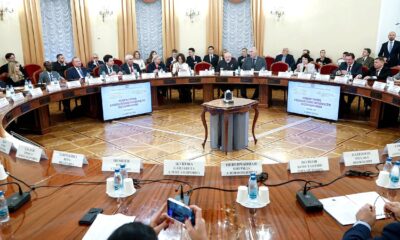Breaking News
Reps Raise Alarm Over Worsening Insecurity, Warn Nigeria Is “Slipping”
South-South Caucus Leader Victor Nwokolo also gave a grim account of kidnappings and killings in Delta and neighbouring states, saying police often lacked vehicles and resources to confront criminals. He added that some local residents, including commercial motorcyclists, acted as informants for kidnappers.

The House of Representatives yesterday held an extraordinary plenary session on Nigeria’s growing insecurity, with lawmakers delivering some of the most candid and self-critical remarks heard in the chamber in years.
Members warned that the nation was “slipping,” institutions were failing, and that parliament must accept responsibility for helping rescue the country from escalating violence.
Minority Leader Kingsley Chinda said insecurity could not be resolved without honesty and unity, lamenting that Nigerians “travel with fear” and live in a country where government has failed in its fundamental duty.
“If we cannot protect the lives and property of Nigerians as enshrined in our constitution, are we worthy to continue to sit as a parliament?” he asked.
Chinda argued that political violence, porous borders, economic displacement, and extremist ideology were major drivers of insecurity, noting that some politicians had “imported people across our unprotected borders” for political advantage. He called for the establishment of a National Border Force supported by technology, and for the adoption of state or community policing.
He also urged a closed-door engagement with all security chiefs, saying: “We must tell them the feelings of Nigerian people. My heart is heavy for Nigeria.”
Deputy Speaker Benjamin Kalu said the crisis required legislative—not only military—solutions, warning that Nigeria suffers from “weak institutional implementation, inadequate funding, lack of transparency and misalignment between policy and execution.”
He listed a rising wave of banditry, parallel governance structures, abductions of worshippers and schoolchildren, and international scrutiny such as the U.S. designation of Nigeria as a “country of particular concern.”
Kalu said negotiating with bandits undermined the rule of law.
“Despite life imprisonment and death penalty for kidnapping, the practice continues because government entities negotiate with bandits and pay ransom. Amnesty deals embolden these groups,” he said.
He proposed legislation to ban unstructured ransom negotiations, improve transparency in police funding and create a legal framework for drone operations. While supporting state policing, he cautioned: “State police is not a silver bullet, but a necessary evolution of our federal system.”
Leader of the House, Julius Ihonvbere, painted a bleak security picture, saying: “Nigeria now records over 24,000 violent incidents a year,” with deaths reaching 9,500 in 2024. He added that more than 1.5 million Nigerians remained in IDP camps, and that banditry had evolved into organised terrorism in the North-West.
Although he acknowledged government actions—including troop deployments, airstrikes, and mass surrenders—he said non-kinetic strategies were urgently needed.
“Some communities and individuals are involved in encouraging insecurity. Arrests, prosecutions, rehabilitation and reintegration must be strengthened,” he said.
Ado Doguwa issued one of the most dramatic warnings, describing Nigeria as being “under a complete war against humanity.”
“War in the north, war in the west, war in the east, and war down south,” he said.
Doguwa acknowledged government efforts but insisted: “Their best is not good enough,” describing the violence as “horrific,” “tragic,” and “unspeakable.”
He urged lawmakers to consider halting legislative activities if the crisis persisted.
“If the government is not prepared to do the right thing, I urge this House to stand up and pay the supreme cost, shut this House down and declare a legislative emergency until the right thing is done.”
He likened the Kogor Game Reserve in his constituency to “an extension of Sambisa Forest.”
South-South Caucus Leader Victor Nwokolo also gave a grim account of kidnappings and killings in Delta and neighbouring states, saying police often lacked vehicles and resources to confront criminals. He added that some local residents, including commercial motorcyclists, acted as informants for kidnappers.
In response to Doguwa’s shutdown call, Deputy Speaker Kalu cautioned against such a move, saying:
“No problem is too big for the parliament to handle. We will not shut the parliament. We are the solution hope of the nation.”
Opinion Nigeria News










